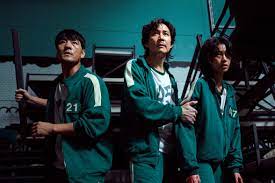‘Squid Game:’ Netflix’s hit show portrays the horrors of economic class warfare

Photo Credit: Young-kyu Park/Netflix
Since its release, “Squid Game” has grabbed the attention of worldwide audiences, becoming the most watched Netflix series.
November 8, 2021
If it seems like the sudden demand for green tracksuits or the revival of Dalgona, a popular South Korean street food, sprang up out of nowhere — you can thank “Squid Game” — Netflix’s recent survival drama series that captured the attention of worldwide audiences and dives into explicit commentary on wealth inequality.
The show centers around debtors who are scouted to take part in a series of six children’s games, such as the classic “Red Light, Green Light.” Upon completion of the games, the sole winner will receive a grand prize of about $38 million, more than enough to settle a contestant’s extensive debt. It seems easy enough, yet the only catch: failing at a game results in immediate death, a dark twist that even the players could not foresee.
“Squid Game” doesn’t exactly have the most original premise — dystopian hits such as “The Hunger Games” follow the same trope of playing a ghastly game to death. However, the standout quality of “Squid Game” lies in the small, clever features of the show.
The rules of each game in “Squid Game” are elementary. They’re simple games that almost anyone can follow, leaving ample time to focus on the show’s complex characterization. Nearly every character has a morally grey component to them — they’re all struggling in debt but while some contestants are hardworking migrant workers who need to support their families, others have embezzled money. There’s players like the protagonist Player 456, aka Seong Gi-hun, a recently divorced father in debt struggling to connect with his daughter, but also happens to be an avid gambler who fails to take care of his elderly mother. Or there’s players like Player 067, aka Kang Sae-byeok, a North Korean defector who needs the prize money to help the rest of her family members escape from North Korea.
Don’t let the simplicity of the games fool you, though. Although the rules are easy to follow, the games often have a fatal twist to them: the classic game of “Tug of War” is played atop a massive platform and a bizarrely huge robot doll acts as a sniper when contestants lose “Red Light, Green Light.” The cinematography of the show manages to mask the simplicity of the games and leaves behind visually interesting, action-packed scenes. In a particularly gory but stellar scene, players are openly killed in slow-motion during a game of “Red Light, Green Light” while a contrasting, jazzy rendition of “Fly Me to the Moon” overlays the background noise.
Unlike many series and movies that tackle social commentary with an allegorical approach, “Squid Game” delivers its themes of class inequality and the effects of modern capitalism explicitly. The context of the story isn’t so unrealistic compared to similar products of the dystopian genre. While many dystopian stories are set in the future, “Squid Game” takes place in the present age. Upon meeting the protagonist Seong Gi-hun, his economic struggles are blatant and realistic, considering the rampant personal debt crisis in South Korea where the series takes place. The creators of the game prided themselves on promoting an equal opportunity for debtors to earn money, yet many instances of the game were unequal: age, personal strength, and the choices players were forced to make in each game played a huge factor in success rate.
The final twist at the end of the series dampened some of the complex characterization and character relations built in previous episodes, but “Squid Game” is definitely worth a watch — that is, if you can stomach the gore that accompanies a powerful story of the exploitation of economic classes.





